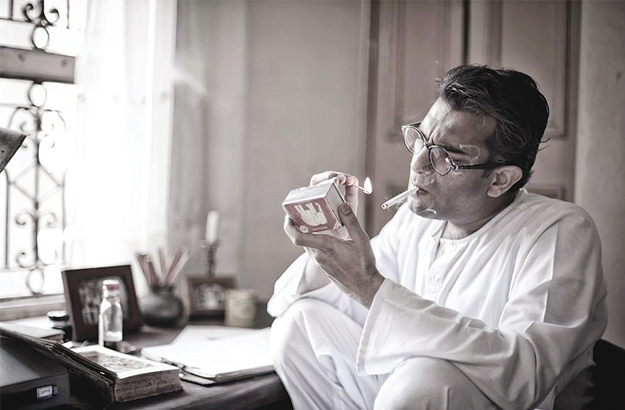There is a sudden, shocking moment in Manto that sets the tone for the new, highly raved about film based on the iconic writer Saadat Hasan Manto. Played by the director and actor Sarmad Sultan Khoosat, he is reading out Khol Do, one of his most well-known short stories, at a literary salon in Lahore. The reading, accompanied by visuals depicting the story almost as a flashback, ends and the audience - Lahore's literati, seated on the edge of their seats - look slightly stunned before they offer up responses that range from the diplomatic to the outraged.
That shock perhaps defines how one looks at the life and times of Manto in Pakistan today. Audiences applaud, but after a second's hesitation, when the film ends. It is this hesitation - the guarded response to a risque piece of art, the self-censorship that dominates journalism, the fear of the mob - which shows that Pakistan today is still more like the literary salon than the egotistic writer calmly and confidently confronting a wrenching tale. And perhaps this is why Manto's ego is justified; where others hesitated, Manto's pencil leaped forward.
"He is a great icon - literary, cultural, even a political, humanistic figure," says critic Asif Farrukhi, who has written extensively about Manto. "He is a very contemporary writer. And he is a kind of mentor - the way he sort of fought with the establishment, stayed true to his ideals and experience, and refused to sell his soul to the devil, which I admire."
Manto's work continues to be read in Pakistan, though Farrukhi recalls that his generation was discouraged from doing so and the number of younger readers now is limited. "He was showing a mirror to society and all its ugliness which still exists," says Hoori Noorani, who runs the Maktaba-e-Daniyal publishing house in Karachi. He notes that while the theme of Partition may not resonate with generations who did not live through it, but "the social aspects and the political undercurrents of his stories are still relevant".
Originally envisaged as a television serial, Manto premiered in Pakistan on September 11. This is not a conventional biopic: it is a fictional version of a small part of Manto's life, inspired by real life events and his work. Khoosat says that when he started out he did not envisage the precise audience for the film: a subject like Manto is tricky enough given how passionate his enthusiasts are. "The thing with Manto is that there is a strange level of ownership everyone has... so I thought I would be really indulgent and selfish on this and this would be my Manto," he says.
Khoosat — who directed the wildly popular Fawad Khan-starrer TV serial Humsafar — says he has been inundated with feedback on the film. The demographic in the theatres is also not your "usual cinema going segment," as Khoosat puts it. It ranges from retirees to teenagers chattering about their experiences of watching a Manto short story performed on stage. "We have this big chunk of enthusiasts — kids from colleges and high schools. They're not only watching the film but they're posting feedback on Twitter and Facebook, and are emailing and calling me," he says.
Manto is set in Lahore, depicting the writer's life in motion. He is perpetually shuttling, on a cycle or a horse cart, between his residence at Laxmi Mansion, his salon, the publisher's offices, the grille of the liquor store, the red-light district and a film studio — to invite Madam Noorjahan to his nephew's birthday party, because who else would have the temerity to do so — and the rooms of a mental institution. It is interspersed with visual retellings of Manto's most well-known works including Toba Tek Singh and Thanda Gosht.
Khoosat is undoubtedly the breakout star of the film; virtually unrecognizable in the second half as his soul begins to consume him. Nimra Bucha as Manto's mirror soul is hauntingly disturbing, a stark contrast to the stoicism and despair essayed by Sania Saeed as Manto's wife. In his account of Manto's life, Khoosat tries to separately examine the parts of Manto's soul - one, the egotistic writer with more than a fondness for alcohol and nicotine, perpetually accused of obscenity and a near-absentee father and husband. The other is a man tortured by Partition and the raw, brutal characters created by events and Manto's sharp pencil. But it is impossible to separate the two.
Khoosat also made a conscious decision to keep the story limited. "It should be an intimate affair and less is more," he says. "I never thought of it as being a disadvantage, so when I was sitting down with my production team, I said maybe we can explore other things more." His decision also makes sense given the volume of Manto's work. "Just the year he spent in Bombay alone after his family had migrated to Pakistan in 1947 could be a separate film," he says.
In the film, Manto wistfully remembers Bombay as he roams around Karachi. Bombay, and the rest of India, may get to see the film soon. Khoosat is talking to Geo Films, which backed Manto's release, about a full-out theatre release in India or screening it on the film festival circuit. "It would be very sad if the logistics don't work out," says Khoosat.

No comments:
Post a Comment